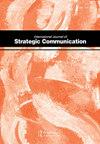象牙塔中的流行病问题:探索COVID-19危机期间的员工敬业度
IF 1.9
Q1 COMMUNICATION
International Journal of Strategic Communication
Pub Date : 2023-10-19
DOI:10.1080/1553118x.2023.2235333
引用次数: 0
摘要
摘要本研究旨在探讨新冠肺炎危机期间,沟通如何构成研究型大学员工的敬业体验。研究人员对美国研究型大学的研究副总裁、研究中心和研究所主任、支持人员以及研究人员进行了21次半结构化的深度访谈。调查结果揭示了矛盾的参与体验。参与者报告说,由于信息和通信技术的增加,界限变得模糊,这也使他们无法停止工作。据报道,在危机期间,过度沟通既是一种常见的非正式沟通经历,也是一种正式的组织沟通策略。大学似乎对危机有部分准备,结果表明个人应对策略可以服务于由沟通构成的消极参与体验。讨论了内部危机沟通策略和员工敬业度理论的启示。披露声明作者未报告潜在的利益冲突。本文章由计算机程序翻译,如有差异,请以英文原文为准。
Pandemic Problems in the Ivory Tower: Exploring Employee Engagement During the COVID-19 Crisis
ABSTRACTThe purpose of this study was to investigate how communication constituted the engagement experiences of employees at research-intensive universities during the COVID-19 crisis. Twenty-one semi-structured in-depth interviews were conducted with vice presidents of research, research center and institute directors and support staff, and research faculty at research-intensive universities in the U.S. The findings revealed paradoxical engagement experiences. Participants reported blurred boundaries through increased technological access to information and communication that also created no way to shut off work. Overcommunication was reported as both a common informal communication experience and a formal organizational communication strategy during the crisis. Universities seemed to be partially prepared for the crisis, and the results demonstrated that individual personal coping strategies can serve one’s negative engagement experience constituted by communication. Implications for internal crisis communication strategy and employee engagement theory are discussed. Disclosure statementNo potential conflict of interest was reported by the author(s).
求助全文
通过发布文献求助,成功后即可免费获取论文全文。
去求助
来源期刊

International Journal of Strategic Communication
Social Sciences-Sociology and Political Science
CiteScore
3.40
自引率
0.00%
发文量
39
期刊介绍:
The International Journal of Strategic Communication examines the philosophical, theoretical, and applied nature of strategic communication, which is “the purposeful use of communication by an organization to fulfill its mission.” IJSC provides a foundation for the study of strategic communication from diverse disciplines, including corporate and managerial communication, organizational communication, public relations, marketing communication, advertising, political and health communication, social marketing, international relations, public diplomacy, and other specialized communication areas. The IJSC is the singular forum for multidisciplinary inquiry of this nature.
 求助内容:
求助内容: 应助结果提醒方式:
应助结果提醒方式:


